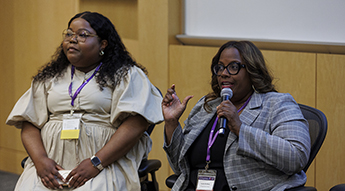Terri Sabol
Associate Professor of Human Development and Social Policy
IPR Fellow | Faculty Co-Chair of the Early Childhood Research Alliance of Chicago (EC*REACH)
PhD, Applied Development Science, University of Virginia
Terri Sabol is a developmental psychologist who conducts research at the intersection of child development and social policy. She investigates how individual and environmental factors contribute to children’s healthy development and applies this scientific evidence to strengthen early childhood education (ECE) programs and policies in the United States. Her broad goal as a scholar is to produce innovative research to help optimize investments in ECE and support children in the 21st century. In particular, she has initiated three lines of research that focus on ways to optimize investment in early childhood education. First, she studies how young children’s lives unfold over time to discover new ways that early childhood education can enhance child development. Second, she examines micro-level classroom processes to advance the framework for assessing and improving ECE quality. Third, she expands the study of ECE to include the broader contexts in which ECE takes place, including families, neighborhoods, and most recently, the COVID-19 pandemic.
Her work has been published in developmental journals (Child Development, Developmental Psychology, Annual Review of Psychology), as well as policy (Journal of Policy Analysis and Management), education (American Education Research Journal, Journal of Research on Education Effectiveness) and social science journals (Science, Annals of the New York Academy of Science). Her work has been supported by the National Institutes for Health, Institute for Education Sciences (IES), Administration of Children and Families, as well as the McCormick Foundation and the Foundation for Child Development. She received the AERA-SRCD Early Career Fellow in Early Childhood Education and was awarded the Association for Psychological Science (APS) Rising Star award. She currently serves as the director of the Development, Early Education, and Policy (DEEP) lab and is the Faculty Co-Director of the Early Childhood Research Alliance of Chicago (EC*REACH).
Current Research
Characterizing Impact Variation of Early Childhood Education Interventions. In this IES-funded project, Sabol and her colleagues, including IPR education researcher and statistician Larry Hedges, are building the early childhood education evidence base. The researchers identify the conditions that contribute to the effectiveness of professional development programs for early childhood classroom quality and child learning outcomes. Using cutting-edge statistical approaches, they explore whether variation in the programs’ effects is predicted by characteristics within school walls, such as the composition of students; teacher qualifications and psychological characteristics; and center structural characteristics, such as enrollment size, as well as out of school walls (gentrification, green space, businesses, resources, and disorder).
Developing New Tools to Understand Young Children’s Perceptions of Early Childhood Interventions. Too often, researchers do not include children’s own voices and interpretations of their experiences in early childhood interventions/policies. Advances in measurement tools, largely based in clinical and therapeutic research, suggest that young children can accurately and reliably report on their own experiences (e.g., the Berkeley Puppet Interview [BPI]), refuting decades of prior assumptions that very young children cannot express interpretations of their experiences. Yet, tools like the BPI have not been widely used in ECE evaluations, largely due to their time and cost (live data collection and intensive coding). Sabol and her former graduate student, Andrea Busby, developed a novel, time-efficient assessment paradigm—the Childhood Assessment Tool - Electronic (CHAT-E)—to assess children’s meaning making of themselves and their broader environments. The CHAT-E uses a similar approach to the BPI—namely, using two identical puppets that express two opposing statements and asks children to choose the one that is more like them (e.g., I like school/I don’t like school)—but adapted for a tablet-based system using animated characters (see https://sites.northwestern.edu/chate/). She has used this tool in an evaluation of an ECE intervention, namely the Kindergarten to College program, which provides college savings accounts to all kindergarteners in Oakland Public Schools. The long-term goal is to continue refinement of the CHAT-E with the goal that researchers could develop their own scales for a range of ECE interventions and use the tool to learn what children think about the very programs/policies designed for them.
Expand the measures and statistical methods used to capture children’s individual experiences in ECE classrooms, with a particular focus on promoting equitable interactions. Sabol is currently the co-PI of a grant from IES (PI: Dr. Sandy Hong, UNC Chapel Hill) that leverages data from the Emerging Academic Snapshot measure, which captures 20-second interval “snapshots” of classrooms over two days. They are using this measure to characterize the extent to which children’s engagement varies within classrooms or within individual children from day to day among children from racially/ethnically diverse backgrounds. In addition, with UChicago developmental psychologist Onnie Rogers and IPR psychologist Sandra Waxman, Sabol and her colleagues are building a measurement toolkit to address race-based disparities in preschool discipline practices. Through the support of the SESP Venture Funds (role: PI), they are building a tablet-based toolkit to assess how children see themselves and are seen by others, their own awareness and perceptions of teacher biases and disciplinary practices, and how this intersects with teachers’ own biases and behaviors in the classroom. The goal is to design a reliable, valid, and efficient set of measures to better discover the mechanisms underlying the preschool race/ethnic disparities that can be used as the foundation for teacher professional development.
Selected Publications
Sabol, T., C. Kessler, O. Rogers, A. Petitclerc, J. Silver, M. Briggs-Gowan, and L. Wakschlag. 2022. A window into racial and socioeconomic status disparities in preschool disciplinary action using developmental methodology. Annals of the New York Academy of Sciences 1508(1): 123–36.
Sabol, T., D. McCoy, K. Gonzalez, L. Miratrix, L. Hedges, J. Spybrook, and C. Weiland. 2022. Exploring treatment impact heterogeneity across sites: Challenges and opportunities for early childhood researchers. Early Childhood Research Quarterly 58: 14–26.
McCoy, D., T. Sabol, W. Wei, A. Busby, and E. Hanno. 2022. Pushing the boundaries of education research: A multidimensional approach to characterizing preschool neighborhoods and their relations with child outcomes. Journal of Educational Psychology 115(1): 143–59.
Sabol, T. 2021. Improving preschool accountability systems: Bringing individual children’s experiences back to child policy. Policy Insights from the Behavioral and Brain Sciences 8(2): 217–24.
Sabol, T., A. Busby, and M. Hernandez. 2021. A critical gap in early childhood policies: Children’s meaning making. Translational Issues in Psychological Science 7(1): 9–20.
Sabol, T., T. E. Sommer, P. L. Chase-Lansdale, and J. Brooks-Gunn. 2021. Intergenerational economic mobility for low-income parents and their children: A dual developmental science framework. Annual Review of Psychology 72(1): 265–92.
Elliott, W., H. Zheng, T. Sabol, and M. O’Brien. 2021. A step toward measuring children’s college-bound identity in children’s savings accounts programs: The case of Promise Scholars. Children and Youth Service Review 121: 105791.
Wei, W., D. McCoy, A. Busby, E. Hanno, and T. Sabol. 2021. Beyond neighborhood socioeconomic status: Exploring the role of neighborhood resources for preschool classroom quality and early childhood development. American Journal of Community Psychology 67(3–4): 470–85.
Hong, S., T. Sabol, M. Burchinal, N. Forestieri, L. Tarullo, M. Zaslow, E. Peisner- Feinberg. 2020. ECE quality indicators and child outcomes: Analyses of six large child care studies. Early Childhood Research Quarterly 49: 202–17.
Sommer, T. E., W. Schneider, E. Chor, T. Sabol, P. L. Chase-Lansdale, J. Brooks-Gunn, H. Yoshikawa, A. Morris, and C. King. 2020. A two-generation education intervention and children’s attendance in Head Start. Child Development 91(6): 1916–33.
Sabol, T., E. Ross, and A. Frost. 2019. Are all Head Start classrooms created equal?: The relation between within-center classroom quality and child outcomes. American Education Research Journal 57(2): 504–34.
Sabol, T., N. Bohlmann, and J. Downer. 2018. Low-income ethnically diverse children’s engagement as a predictor of school readiness above preschool classroom quality. Child Development 89(2): 556–76.


